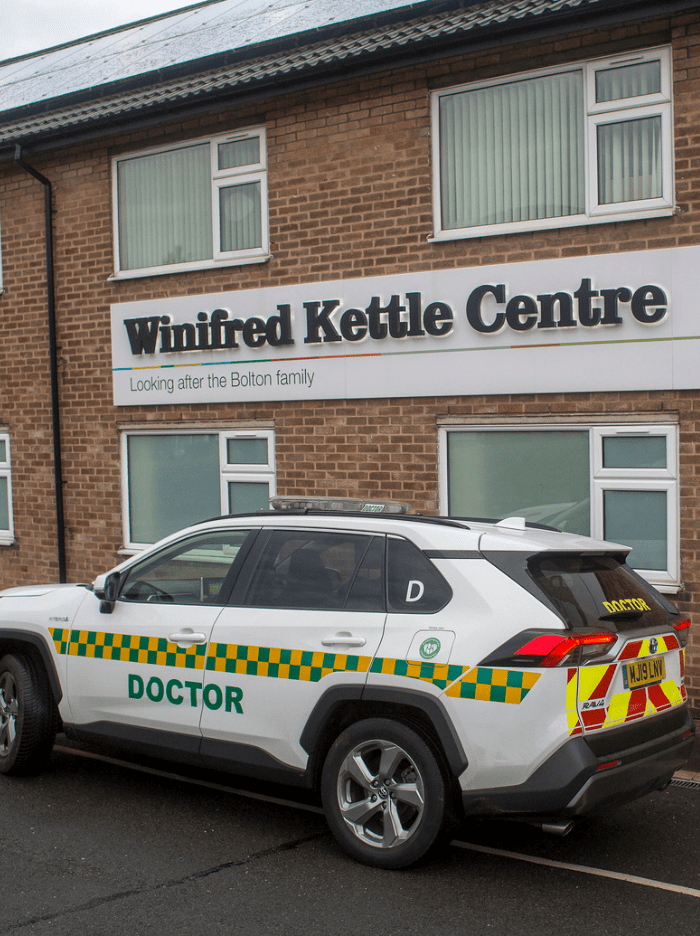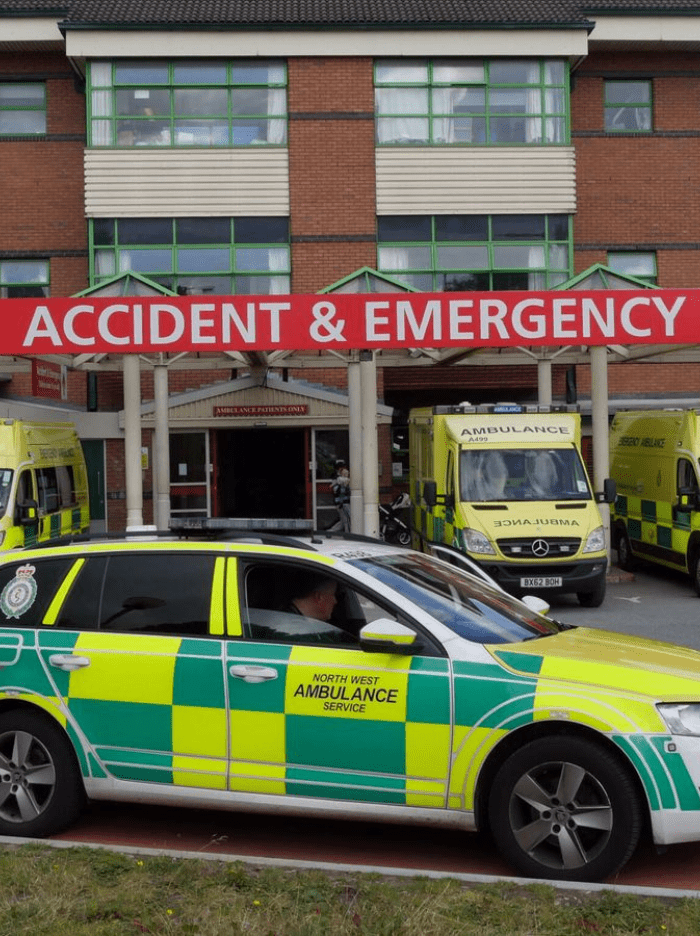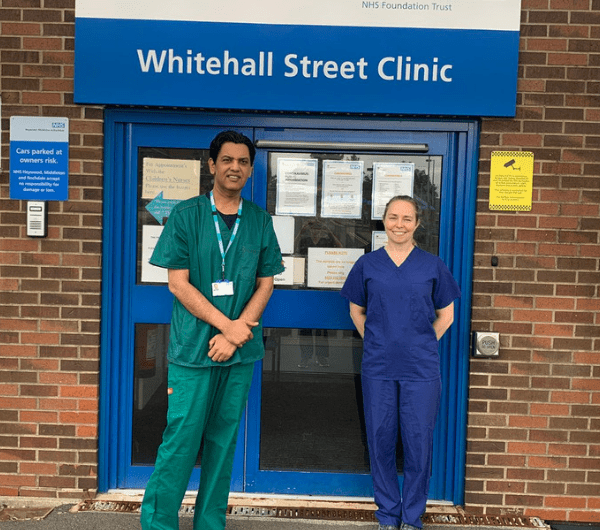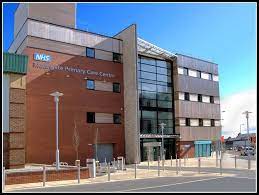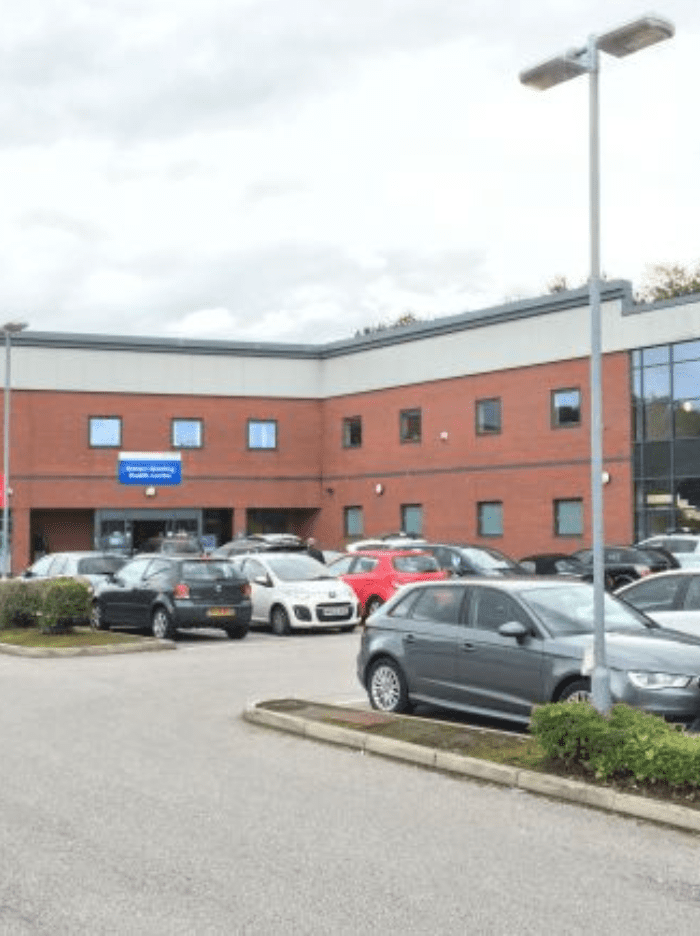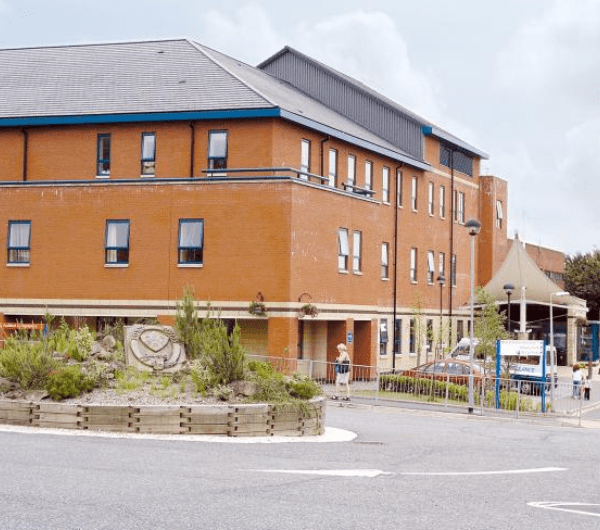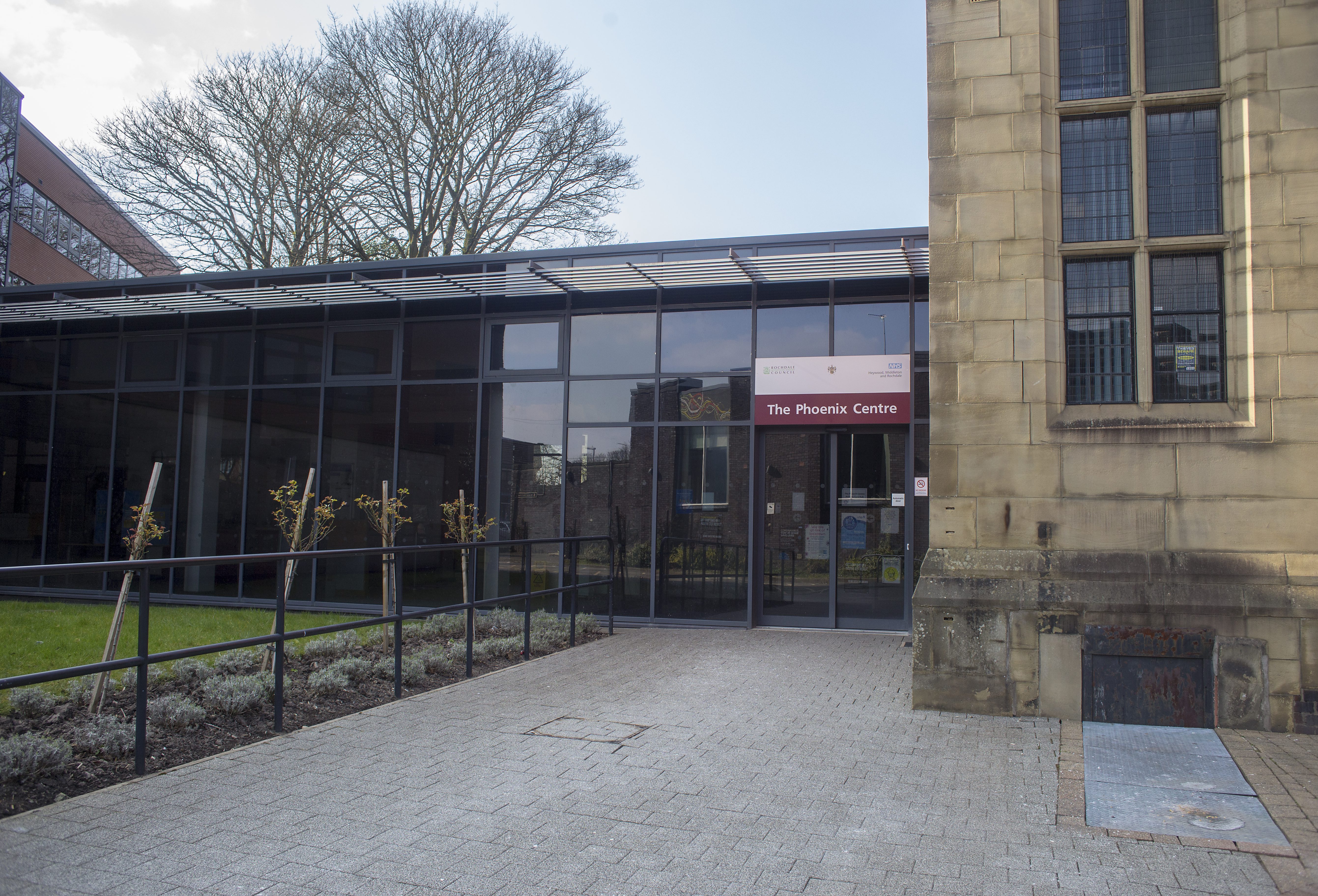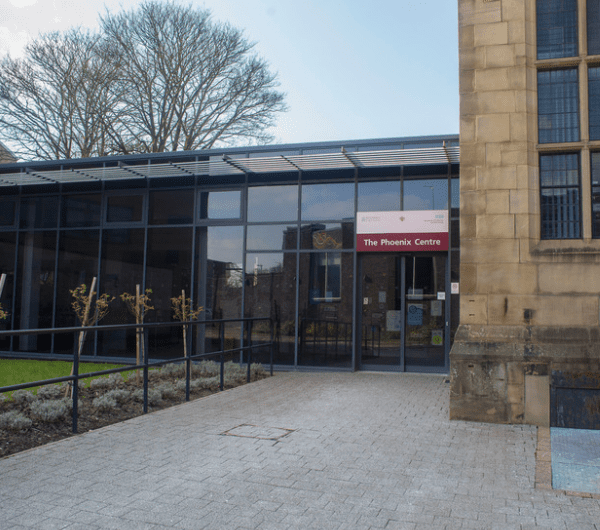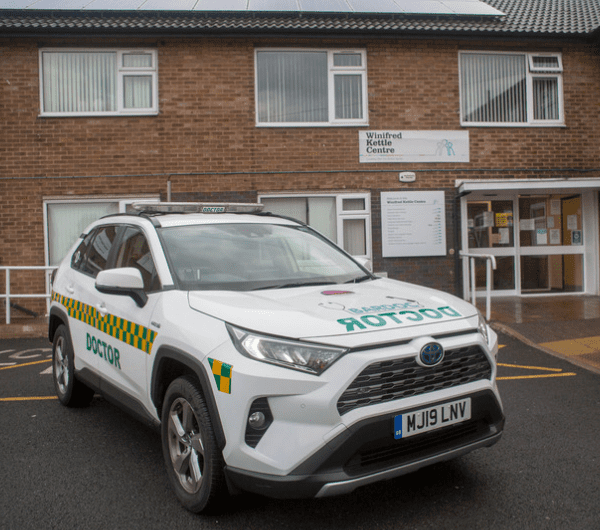- Home
- How We Serve You
- GP Practices
- Rock Healthcare
Rock Healthcare
Rock Healthcare exists to expand family GP services to the whole of the Bury Community, reaching out to everybody, providing state of the art facilities and services through a modern, flexible group of local doctors and healthcare professionals who have looked after generations of local families. We will listen and respond to your needs and between us we will have a healthier Bury.

We are pleased to offer Extended Hour Appointments 7:15 - 8:00am
Did you know that 10 of the most minor ailments seen by GPs can also be treated by you at home?
By treating yourself at home you could save a trip to the surgery and free up time for the GPs to see patients with more serious health problems.
Read about some of the most effective home treatments on the NHS Choices website for:
Back pain
Dermatitis
Heartburn and indigestion
Nasal congestion (blocked nose)
Constipation
Migraines
Coughs
Acne
Sprains and strains
Headaches
Antibiotics
Each year 25% of the population visit their GP for a respiratory tract infection (eg sinus, throat or chest infection). These are usually caused by viruses.
For patients who are otherwise healthy, antibiotics are not necessary for viral infections.
These infections will normally clear up by looking after yourself at home with rest, plenty of fluids and paracetamol.
Ear infections typically last 4 days
89% of cases clear up on their own
A sore throat typically lasts 7 days
40% of cases clear up after 3 days and 90% after 7 days without antibiotics
Sinusitis typically lasts 17 days
80% clear up in 14 days without antibiotics
Cough/bronchitis typically lasts 21 days
Antibiotics reduce symptoms by only 1 day
Antibiotics only work for infections caused by bacteria.
Taking unnecessary antibiotics for viral infections should be avoided because they may not be effective next time you have a bacterial infection.
Patients with long-term conditions such as asthma, diabetes and COPD are eligible for flu and pneumococcal vaccinations. Ask at reception for more information.
Medicine cabinet
You can treat many minor ailments such as colds, coughs and indigestion by keeping a well-stocked medicine cabinet at home.
We suggest you keep the following:
- Paracetamol and aspirin (children under 16 and people with asthma should not take aspirin)
- Mild laxatives
- Anti-diarrhoeal medicines
- Rehydration mixture
- Indigestion remedy (for example, antacids)
- Travel sickness tablets
- Sunscreen – SPF15 or higher
- Sunburn treatment (for example, calamine)
- Tweezers and sharp scissors
- A thermometer
- A selection of plasters, non-absorbent cotton wool, elastic bandages and dressings
Remember:
- Keep the medicine chest in a secure, locked place out of reach of small children
- Always read the instructions and use the suggested dose
- Watch expiry dates – don’t keep or use medicines past their sell-by date
- Take all unwanted and out-of-date medicines back to the pharmacy
All GP appointmenst consist of a 10 minute consultation. It is advised to book a double appointment when wishing to discuss multiple/ complex. This is in place to ensure the safety of our patients and avoid delays in the clinics.
Available 8.30am Monday – Fridays (when phone lines open)
Our practice is committed to offering you an appointment within 48 hours with a doctor if you have a problem. You may request to see any of the doctors or nurses within our team, but we do encourage you to take any GP appointment that is available in an emergency.
If you require an emergency appointment, please phone the practice between 8:30 – 9:30 to arrange an appointment on the day with available on-call doctors. Please be aware that if you are calling for an emergency appointment, the doctors have asked the receptionists to get some detail regarding the reason for your call. This will ensure you are dealt with in the most appropriate way and enable us to prioritise patients who have the greatest need.
In a number of cases it might be worth considering an appointment with a practice nurse rather than a doctor. Practice nurses are qualified to deal with many conditions and you may be seen more quickly.
If you cannot attend an appointment for any reason please inform us as soon as possible in order for us to give the slot to someone else. Repeated failure to attend booked appointments will result in removal of your name from our lists.
Patients on long-term medication can order repeat prescriptions in the following ways:
- Online – Using the NHS App Click to Download
- In person – Come in to the surgery to order it at reception.
- Pharmacy – Ask a pharmacy to order it on your behalf.
- Email – your request to: gmicb-bu.rockhealthcare@nhs.net
Prescriptions Charges and Exemptions
Extensive exemption and remission arrangements protect those likely to have difficulty in paying charges (NHS prescription and dental charges, optical and hospital travel costs).
The NHS prescription charge is a flat-rate amount which successive Governments have thought it reasonable to charge for those who can afford to pay for their medicines. Prescription prepayment certificates (PPCs) offer real savings for people who need extensive medication.
NHS charges
These charges apply in England only. In Northern Ireland, Scotland and Wales prescriptions are free of charge.
- Prescription (per item): £9.65
- 12-month prepayment certificate (PPC): £111.60
- 3-month PPC: £31.25
If you will have to pay for four or more prescription items in three months, or more than 15 items in 12 months, you may find it cheaper to buy a PPC.
- Telephone advice and order line 0300 330 1349
- General Public – Buy or Renew a PPC On-line
There is further information about prescription exemptions and fees on the NHS website
You can register by completing the registration form attached below. This can also be obtained from the practice.
When you register, we will ask you to make an appointment to see either the practice nurse or healthcare support worker for a new patient health check. This will ensure that our records are accurate and all routine checks to promote your health and wellbeing (such as blood pressure/smear tests/mammograms) are up-to-date.
You will need to complete this by hand and bring it to the surgery.
You will have a named, accountable doctor who is responsible for coordinating your care. You can still talk to or make appointments to see any of our doctors or nurses, not just your named GP.
We recommend that new patients undertake a health check with a practice nurse.
Online ‘Pre-Registration’ With The Practice
If you wish to pre-register click on the link below to open the form. When you have completed all of the details, click on the “Send” button to mail your form to us. When you visit the surgery for the first time you will be asked to sign the form to confirm that the details are correct.
When you register you will also be asked to fill out a medical questionnaire. This is because it can take a considerable time for us to receive your medical records. There is an online version of this file too, which you may fill out and send to us. When you come to the surgery you will be asked to sign this form to confirm that the details are correct.
Online Medical Questionnaire For New Patients
Note that by sending the form you will be transmitting information about your self across the Internet and although every effort is made to keep this information secure, no guarantee can be offered in this respect.
Alternatively you may print off a registration form, fill it out and bring it in with you on your first visit to the practice.
These fact sheets have been written to explain the role of UK health services, the National Health Service (NHS), to newly-arrived individuals seeking asylum. They cover issues such as the role of GPs, their function as gatekeepers to the health services, how to register and how to access emergency services.
Special care has been taken to ensure that information is given in clear language, and the content and style has been tested with user groups. Open the leaflets in one of the following languages
Temporary Registration
If you are ill while away from home or if you are not registered with a doctor but need to see one you can receive emergency treatment from the local GP practice for 14 days. After 14 days you will need to register as a temporary or permanent patient.
You can be registered as a temporary patient for up to three months. This will allow you to be on the local practice list and still remain a patient of your permanent GP. After three months you will have to re-register as a temporary patient or permanently register with that practice.
Please note this type of registration is subject to our current list size and availability of the GPs.
To register as a temporary patient simply contact the local practice you wish to use. Practices do not have to accept you as a temporary patient although they do have an obligation to offer emergency treatment. You cannot register as a temporary patient at a practice in the town or area where you are already registered.
Daily GP clinics
Monday to Friday morning and afternoon sessions between 8am and 6pm face to face or telephone.
Nursing clinics
Monday to Friday morning and afternoon sessions between 8am and 6pm with our team of Practice Nurses and Healthcare Support Workers.
Baby and Antenatal/Postnatal Care
Baby and antenatal/postnatal care with our Health Visitors, Midwives and Rock clinical teams including birth advice, immunisations, early years support and signposting to other services.
Paediatric Bloods
Paediatric bloods can be arranged for your children when they need a blood test without having to go to hospital.
Minor Surgery Services
Dr Johnston offers minor surgery to our patients. Please speak to a GP who will refer you into our minor surgery clinics if appropriate.
Chaperones are available on request. Clinicians will also request a chaperone for any appointments necessitating an intimate procedure.
Some services provided are not covered under our contract with the NHS and therefore attract charges.
Private medical report services are available on request. A qualified, experienced GP will complete reports required by legal teams, accident services and Department of Work and Pensions – just ask for a price guide at reception.
As well as our practice, there are many other local NHS services you can contact for health advice, information or treatment.
You can ask your local pharmacist about lots of health issues, including when to visit your GP. And there’s no need for an appointment.
Since our telephones are very busy in the early morning, we ask you to telephone for test results (e.g. blood, urine, x-ray) after 2pm.
To ensure confidentiality, we only release results to the patient, unless alternative arrangements have been agreed in writing.
Did you know that 10 of the most minor ailments seen by GPs can also be treated by you at home?
By treating yourself at home you could save a trip to the surgery and free up time for the GPs to see patients with more serious health problems.
Read about some of the most effective home treatments on the NHS Choices website for:
Back pain
Dermatitis
Heartburn and indigestion
Nasal congestion (blocked nose)
Constipation
Migraines
Coughs
Acne
Sprains and strains
Headaches
Antibiotics
Each year 25% of the population visit their GP for a respiratory tract infection (eg sinus, throat or chest infection). These are usually caused by viruses.
For patients who are otherwise healthy, antibiotics are not necessary for viral infections.
These infections will normally clear up by looking after yourself at home with rest, plenty of fluids and paracetamol.
Ear infections typically last 4 days
89% of cases clear up on their own
A sore throat typically lasts 7 days
40% of cases clear up after 3 days and 90% after 7 days without antibiotics
Sinusitis typically lasts 17 days
80% clear up in 14 days without antibiotics
Cough/bronchitis typically lasts 21 days
Antibiotics reduce symptoms by only 1 day
Antibiotics only work for infections caused by bacteria.
Taking unnecessary antibiotics for viral infections should be avoided because they may not be effective next time you have a bacterial infection.
Patients with long-term conditions such as asthma, diabetes and COPD are eligible for flu and pneumococcal vaccinations. Ask at reception for more information.
Medicine cabinet
You can treat many minor ailments such as colds, coughs and indigestion by keeping a well-stocked medicine cabinet at home.
We suggest you keep the following:
- Paracetamol and aspirin (children under 16 and people with asthma should not take aspirin)
- Mild laxatives
- Anti-diarrhoeal medicines
- Rehydration mixture
- Indigestion remedy (for example, antacids)
- Travel sickness tablets
- Sunscreen – SPF15 or higher
- Sunburn treatment (for example, calamine)
- Tweezers and sharp scissors
- A thermometer
- A selection of plasters, non-absorbent cotton wool, elastic bandages and dressings
Remember:
- Keep the medicine chest in a secure, locked place out of reach of small children
- Always read the instructions and use the suggested dose
- Watch expiry dates – don’t keep or use medicines past their sell-by date
- Take all unwanted and out-of-date medicines back to the pharmacy
If you require any vaccinations relating to foreign travel you need to make an appointment with the practice nurse to discuss your travel arrangements. This will include which countries and areas within countries that you are visiting to determine what vaccinations are required.
It is important to make this initial appointment as early as possible – at least 6 weeks before you travel – as a second appointment will be required with the practice nurse to actually receive the vaccinations. These vaccines have to be ordered as they are not a stock vaccine. Your second appointment needs to be at least 2 weeks before you travel to allow the vaccines to work.
Some travel vaccines are ordered on a private prescription and these incur a charge over and above the normal prescription charge. This is because not all travel vaccinations are included in the services provided by the NHS.
To help us offer the appropriate advice, please fill out the online form before coming to see the nurse.
If you are travelling to Europe a very useful booklet has been published with advice and guidance to help you get the most out of your holiday. To visit please click:- http://ec.europa.eu/publications/booklets/eu_glance/86/en.pdf (this is a large document and may take a minute or two to view)
Frequently Asked Question
We understand it can often be a stressful time when yourself or someone you care for is unwell. Below are a few commonly asked questions.
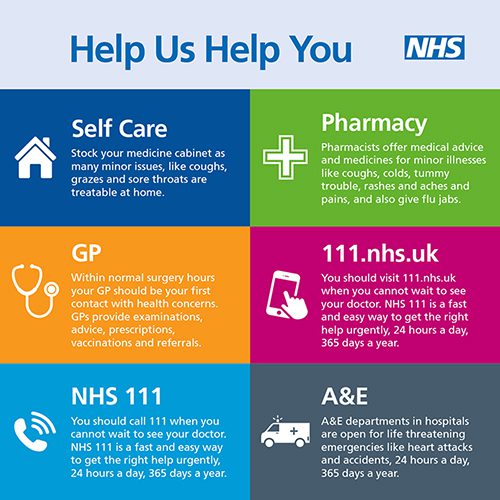
Urgent treatment centres are usually overseen by doctors (sometimes GPs) working with nurses.
If you need one, you can often get tests like an ECG (electrocardiogram), blood tests or an x-ray.
They can diagnose and deal with many of the most common problems people go to A&E for.
These are things like:
- broken bones and sprains
- injuries, cuts and bruises
- wound dressing
- stomach pain
- coughs, colds and breathing problems
- vomiting and diarrhoea
- skin infections and rashes
- high temperature (fever) in children and adults
- mental health problems
If a doctor decides you need a prescription, they can organise one for you. Emergency contraception is also available.
Use NHS 111 online (111.nhs.uk) or call 111 if you think you need medical help right now.
We can direct you to the best place to get help if you cannot contact your GP during the day, or when your GP is closed (out-of-hours).
Depending on what you need, you might be advised to:
- call 999 or go to A&E in an emergency
- go to an urgent treatment centre
- see an evening and weekend GP (out-of-hours GP)
- get a callback from a nurse
- contact an emergency dentist or find a dentist
- contact your own GP surgery
- see a pharmacist for a minor illness or to get medicine
- look after yourself safely at home
111 online cannot:
- issue fit notes – you need to contact your GP
- make or cancel appointments for you in other parts of the NHS
111 online asks for feedback, but this is only used to help improve our service.
We are unable to respond to requests for medical help left as feedback.
Frequently Asked Question

We understand it can often be a stressful time when yourself or someone you care for is unwell. Below are a few commonly asked questions.
We try to keep our GP appointments for patients with more serious health problems.
Before you book an appointment to see a doctor please consider whether an appointment with a practice nurse might be appropriate. They can help you with a wide range of medical problems.
Our receptionists can help you decide which is the right person for you to see.
If you have a cough, cold, headache or other minor ailment try treating yourself at home first. Find out more about treatments for common minor ailments.
Please remember that self-care for common conditions can help free up our GPs’ time, making it easier to get an appointment when you have a more serious condition.
Pharmacists are highly trained health professionals and can give you confidential health advice for a range of common illnesses and complaints.
Don’t wait for a GP appointment for coughs, colds, aches and pains. If you require further help after trying self care for these ailments just call your local pharmacy or drop in – there’s no need to make an appointment.
Your pharmacists can also help you decide if you need to see a doctor or nurse.
Urgent treatment centres are usually overseen by doctors (sometimes GPs) working with nurses.
If you need one, you can often get tests like an ECG (electrocardiogram), blood tests or an x-ray.
They can diagnose and deal with many of the most common problems people go to A&E for.
These are things like:
- broken bones and sprains
- injuries, cuts and bruises
- wound dressing
- stomach pain
- coughs, colds and breathing problems
- vomiting and diarrhoea
- skin infections and rashes
- high temperature (fever) in children and adults
- mental health problems
If a doctor decides you need a prescription, they can organise one for you. Emergency contraception is also available.
Use NHS 111 online (111.nhs.uk) or call 111 if you think you need medical help right now.
111 can direct you to the best place to get help if you cannot contact your GP during the day, or when your GP is closed (out-of-hours).
Depending on what you need, you might be advised to:
- call 999 or go to A&E in an emergency
- go to an urgent treatment centre
- see an evening and weekend GP (out-of-hours GP)
- get a callback from a nurse
- contact an emergency dentist or find a dentist
- contact your own GP surgery
- see a pharmacist for a minor illness or to get medicine
- look after yourself safely at home
111 online cannot:
- issue fit notes – you need to contact your GP
- make or cancel appointments for you in other parts of the NHS
111 online asks for feedback, but this is only used to help improve the service.
111 are unable to respond to requests for medical help left as feedback.
A&E is for life-threatening accidents and emergencies only. Before you go there, ask yourself, “Is it a real emergency?”
If not, please consider using other local health services before you visit A&E.
Meet The Team
Dr Hanif Awan – Doctor (Male)
Dr Jonaid Mohammed – Doctor (Male)
Dr Qurat Malik – Doctor (Female)
Dr Hussein Rasheed – Doctor (Male)
Dr Hitesh Khanna
Dr Colette Johnston – Doctor (Female)
Dr Liaqat Natha – Doctor (Male)
Dr Iriowen Uwaifo – Doctor (Female)
Shahin Zulfiqar
Chloe Brown (Female)
Muhammad Azam Nazir – Pharmacist (Male)
Yumna Hafeez – Physician Associate (Female)
Rachel Bevan – Pharmacy Technician (Female)
Julie Cahill (Female)
Natalie Wiggan (Female)
Clare Webber (Female)
Hannah Willescroft – Administrator (Female)
Kathryn Willis (Female)
Sharon Smith – Practice Manager (Female)
Practice management staff
Toni Lee – Team Leader (Female)
Amy Yates (Female)
Joanne H (Female)
Siobhan Lawrence (Female)
Reece Heap (Male)
Analeez Sequeira (Female)
Carol Meredith (Female)
Mohammed Alamin (Male)
Paula Piasecka (Female)
Nichola Lawton (Female)
Tracey Turner (Female)
Rachel Hadfield (Female)
Donna Goddard (Female)
Recent Patient Praise
